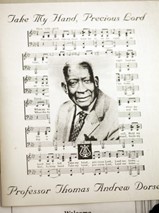
Thomas A. Dorsey and "Precious Lord, Take My Hand" (Continued)

Thomas A. Dorsey
Others have documented the story surrounding its inception, so we will not repeat it here; but listen to Dorsey's own words to how this song came about, followed by Marion Williams's performance.
"Take My Hand, Precious Lord" (With Marion Williams)
Then, listen to Mahalia Jackson's rendition of this gospel song.
"Take My Hand, Precious Lord"
Also, listen to NPR's interview by Linda Wertheimer with Thomas Dorsey biographer Michael W. Harris discussing "Take My Hand, Precious Lord." Dorsey's gospel bluesA form of music that combines evangelistic lyrics with blues instrumentation, often blues guitar accompaniment. songs were an initial step in paving the way for the globalization of gospel music.
"Precious Lord" had been published in more than forty languages. It has been sung by singers as diverse as Aretha Franklin, Nina Simone, Little Richard, Merle Haggard, Engelbert Humperdinck, and Elvis Presley. Mahalia Jackson sang it at the funeral of the Rev. Martin Luther King Jr. Opera soprano Leontyne Price sang "Precious Lord" at the funeral of President Lyndon B. Johnson.… "The songs speaks to people in their moment of need," said the Rev. Marvin Winans, gospel singer and preacher. "I grew up in church where people would just stand up and start singing it.… It symbolized the real frustrations, the challenges of trying to traverse life's experiences and all that that encompasses," said Tammy Kernodle, a minister and professor of musicology.
(Spratling & Press 2013, n.p.)
Michael Harris contributes insights into Dorsey's legacy to the development and globalization of gospel music:
The introductory years of gospel blues shows that [Dorsey] was its central figure. He was the first to publish a gospel piece, " If you See My Saviour" (1928). An examination of the more than 400 gospel songs that he published (not necessarily composed) indicates that he is still today the most prolific composer/publisher in the movement. His best-known work, "Take My Hand, Precious Lord," has become a staple of the Protestant hymnody of both [B]lack and [W]hite Americans. He was one of the founders of the first gospel chorus to be organized in Chicago's mainline churches in 1931 and probably in the United States. In August 1933, he and two associates chartered the National Convention of Gospel Choirs and Choruses, the largest association of gospel singing groups in the United States. [He also served as its national president.] From the late 1930s until the middle 1950s, this organization sent out agents to metropolitan areas to organize choruses. These in turn became the predecessors of the gospel choral groups found in most [B]lack churches today.
(Harris 1992, xix)





